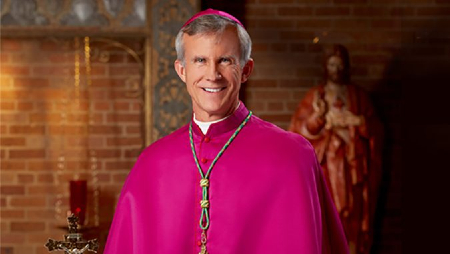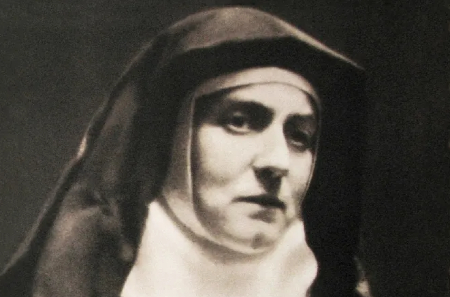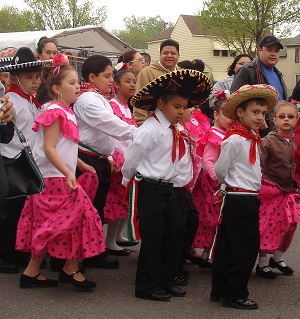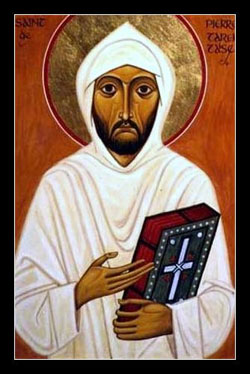 Hi readers, it seems you use Catholic Online a lot; that's great! It's a little awkward to ask, but we need your help. If you have already donated, we sincerely thank you. We're not salespeople, but we depend on donations averaging $14.76 and fewer than 1% of readers give. If you donate just $5.00, the price of your coffee, Catholic Online School could keep thriving. Thank you. Help Now >
Hi readers, it seems you use Catholic Online a lot; that's great! It's a little awkward to ask, but we need your help. If you have already donated, we sincerely thank you. We're not salespeople, but we depend on donations averaging $14.76 and fewer than 1% of readers give. If you donate just $5.00, the price of your coffee, Catholic Online School could keep thriving. Thank you. Help Now >
Bishop Joseph Strickland Issues a Pastoral Letter Regarding the Error of Universalism. Read it HERE
FREE Catholic Classes
My Dear Sons and Daughters in Christ,
It is an honor and a joy to continue to share the basic truths of our Catholic faith with you, as we now delve more deeply into the sixth truth I outlined in my Pastoral Letter of August 22, 2023: "The belief that all men and women will be saved regardless of how they live their lives (a concept commonly referred to as universalism) is false and is dangerous, as it contradicts what Jesus tells us repeatedly in the Gospel. Jesus says we must 'deny yourselves, take up our cross and follow Him.'(Matt 16:24).
 Hi readers, it seems you use Catholic Online a lot; that's great! It's a little awkward to ask, but we need your help. If you have already donated, we sincerely thank you. We're not salespeople, but we depend on donations averaging $14.76 and fewer than 1% of readers give. If you donate just $5.00, the price of your coffee, Catholic Online School could keep thriving. Thank you. Help Now >
Hi readers, it seems you use Catholic Online a lot; that's great! It's a little awkward to ask, but we need your help. If you have already donated, we sincerely thank you. We're not salespeople, but we depend on donations averaging $14.76 and fewer than 1% of readers give. If you donate just $5.00, the price of your coffee, Catholic Online School could keep thriving. Thank you. Help Now >

Bishop Joseph Strickland, Bishop of the Diocese of Tyler, Texas.
Highlights
10/10/2023 (6 months ago)
Published in Living Faith
Keywords: Bishop Joseph Strickland, Letter, Pastoral, Universalism, faith, catechism
He has given us the way, through His grace, to victory over sin and death through repentance and sacramental confession. It is essential that we embrace the joy and hope, as well as the freedom, that come from repentance and humbly confessing our sins. Through repentance and sacramental confession, every battle with temptation and sin can be a small victory that leads us to embrace the great victory that Christ has won for us." We are all sinners, and we are all in need of a Savior because we are all born into original sin and, therefore, subject to its consequences. (cf. Rom 5:12-21). Original sin was the first sin that was committed by our first parents, Adam and Eve, in disobedience of God. That original sin is now a hereditary stain with which we are all born on account of our descent from Adam and Eve. Thus, original sin is an ongoing privation of God's grace, and because of its effect in our lives, we as humans are born in a state of separation from God. If we were left in this state of original sin, we would be eternally separated from God because nothing unclean will be allowed to enter into Heaven. (cf. Rev 21:27). However, through Baptism, God has made a way for us to be justified in Him--through Jesus Christ alone--and to remove not only the stain of the original sin of our first parents which we carry, but also the stain of all actual sins we ourselves commit. And for our sins after we have been baptized, God has given us the Sacrament of Reconciliation (also called Confession or Penance) in order to allow us to repent and be cleansed of the stain of our sins.
From the Catechism of the Catholic Church, we read that "Sin is an offense against God: 'Against you, you alone, have I sinned, and done that which is evil in your sight.' Sin sets itself against God's love for us and turns our hearts away from it. Like the first sin, it is disobedience, a revolt against God through the will to become 'like gods,' knowing and determining good and evil. Sin is thus 'love of oneself even to contempt of God.' In this proud self-exaltation, sin is diametrically opposed to the obedience of Jesus, which achieves our salvation." (CCC 1850).
That first sentence is packed with deep theological insight -- "Sin is an offense against God." Consider that God is infinitely good and holy, and He is infinite love. Thus, according to St. Thomas Aquinas in his Summa Theologica, when we sin, we sin against the infinite, and thus our sins are infinitely offensive to Him. "Now a sin which is committed against God is infinite: because the gravity of a sin increases according to the greatness of the person sinned against (thus it is a more grievous sin to strike the sovereign than a private individual) and God's greatness is infinite. Therefore, an infinite punishment is due for a sin committed against God." (Summa Theologica; I-II, q.87, a. 4, obj. 2).
In our current society which is so afflicted with the errors of moral relativism, the temptation is all too strong to look at the weight of sin from a human perspective rather than from the divine perspective. We make excuses for our sins, explaining that the things we do are "not all that bad." Further, the temptation exists to presume upon the mercy of God, assuming that surely a loving and merciful God will overlook our disobedience and failures even if we do not seek forgiveness because He is infinitely merciful. This line of thinking sometimes progresses to our assuming that salvation will ultimately be offered to all people simply because God is infinitely merciful, and therefore all men will be saved. This is the error of universalism. This error could lead one to ask, "What then is the point of conversion of heart to Jesus Christ? Why bother following Christ at all?" This is extremely dangerous, as it prevents us from seeing the need for true and authentic repentance. It is a deadly indifference that imperils our immortal souls and puts us at eternal risk of separation from God. "For the wages of sin is death, but the gift of God is eternal life in Christ Jesus our Lord." (Rom 6:23). Although God does make an accommodation for our weak and fallen human nature, that accommodation is through the sacraments of Baptism and Reconciliation (sacramental confession) which move us into a right relationship with Our Savior Jesus Christ, through whom alone our salvation comes.
Sin damages our relationship with God and cuts us off from sharing in His life of grace, and we cannot restore this life of grace ourselves as we are finite beings with only finite capabilities, and the One whom we have offended through sin is infinite. We are not capable of making infinite reparations. Thus, we can only reestablish a life of grace through the One who is infinite. He alone is capable of restoring life. "When the disciples heard this, they were greatly astonished and said, 'Who then can be saved?' Jesus looked at them and said, 'For human beings this is impossible, but for God all things are possible.'" (Matt 19:25-26). Salvation comes by Jesus alone (c.f. Acts 4:12). The saving grace that Jesus Christ won for us on the cross is a free gift from God that man receives through repentance, faith, and baptism. Once we are baptized into Christ, it is through repentance and sacramental confession that every battle with temptation and sin can be a small victory that leads us to embrace the great victory that Christ has won for us.
A key word I would like us to reflect on in this discussion is "metanoia." This Greek word means "change in one's way of life resulting from penitence or spiritual conversion." This change lies at the heart of what it means to be a disciple of Jesus Christ, and while it involves an initial choice to turn around and follow Christ, metanoia actually denotes a way of life that seeks constant change to follow Jesus Christ more fully and more profoundly. Many of the stories of the greatest saints involve a profound metanoia: St. Augustine, St. Ignatius of Loyola, St. Francis of Assisi, St. Mary Magdalene and St. Theresa Benedicta, to name only a few. Their stories involve a dramatic turn from sin and a clear choice to be forever changed and to follow Jesus Christ. The drama of their moments of conversion are then followed by a lifetime of turning more fully to the Sacred Heart of Jesus, and more completely away from sin.
Now that we have examined the great danger in universalism--and in denying that the price of sin is eternal separation from God unless we embrace the call to repentance of sin and living in the Way of Jesus Christ--how do we move into the joy and the hope, as well as the freedom, that comes from true repentance and turning to Christ? In the simplest of terms, the answer to how we go about this is to live out our Catholic faith in Word and Sacrament. The Word of God contained in the Sacred Scriptures nurtures us throughout this journey and points us always to truth; and the sacraments--instituted by Christ Himself--offer us encounters with God's grace that strengthen us along the way, changing us from sinner to saved.
As we deepen our understanding of the sacraments, and in particular the sacraments of Baptism, Confirmation, and Reconciliation (also called Confession or Penance), we are drawn more deeply into the metanoia we are all called to embrace. These three sacraments in particular build on one another as our relationship with Jesus Christ grows. While the Church acknowledges that God is sovereign and therefore, He is not bound to dispensing His grace through the sacraments alone, we recognize that the sacraments are essential for the Christian life and are the ordinary means that God has given to us so that we may receive sanctifying grace and the salvation He won for us on the cross.
Baptism of course is the necessary sacrament of our initial repentance, conversion, and incorporation into the Christian life. It frees us from original sin and gives us sanctifying grace, allowing us to share in His life and love. A beautiful and essential element of the Church's teaching is the indelible (permanent) character that Baptism confers on a person; one can never be unbaptized. In the Nicene Creed we recite at mass, we confess "one Baptism for the forgiveness of sins." The great consolation here is that once configured to Christ, we can always return to Him no matter how far we have wandered away in our sinfulness, if only we repent and confess our sins. Thus, Baptism permanently configures us to Christ and gives us the grace to live this new relationship.
Confirmation is most profoundly a strengthening of the original gift of life in the Holy Spirit that we receive at Baptism. Pentecost as described in the Acts of the Apostles can be understood as the Confirmation of the Apostles in the Holy Spirit, and we can see clearly the spiritual strength they received as they formed the Church in Her beginnings. We are blessed with the very same gifts of the Holy Spirit when we are confirmed, and this sacrament gives us the strength to constantly turn from sin and grow closer to the Sacred Heart of Christ.
Finally, the Sacrament of Reconciliation (or Confession or Penance) can be described as the sacrament of continuing metanoia. We all stumble in sinfulness and are called to humbly confess our sins and strive for deeper holiness. In our ongoing journey of faith, the Sacrament of Reconciliation is of critical importance, and we all need to understand that it is a loving encounter with the same Jesus Christ who we receive in the Eucharist. The beauty of this sacrament is that it expresses God's abundant mercy and emphasizes that He never "takes pleasure in the death of the wicked" but constantly gives them the opportunity to "turn from their ways and live." (Ezek 33:11). As the Catechism states: "Those who approach the sacrament of Penance obtain pardon from God's mercy for the offense committed against him, and are, at the same time, reconciled with the Church which they have wounded by their sins and which by charity, by example, and by prayer labors for their conversion." (CCC 1422).
As we face the challenges in the world and the Church today--and in particular with the confusion of the Synod on Synodality raging even as I write this-- let us be reminded that there is only one way to eternal life: "Jesus said to him, 'I am the way and the truth and the life. No one comes to the Father except through me.'" (Jn 14:6). Our Lord also tells us plainly that not all will be saved: "Not everyone who says to me, 'Lord, Lord', will enter the kingdom of heaven, but only the one who does the will of my Father in heaven." (Matt 7:21). Therefore, it is imperative that we remain firmly anchored to the Sacred Deposit of Faith and reject any idea which would deviate from the perennial teachings of the Catholic Church.
This includes any who--in the name of ecumenism or dialogue--would promote the error of universalism or attempt to offer a way of salvation other than through Jesus Christ and His Church. The tragic temptation to eviscerate the meaning of His Life through a so-called universalism that renders Him meaningless is a great manifestation of the evil we face today. Let us reject the notion that all are saved with no need for metanoia, and instead embrace the wondrous metanoia God offers us only through His Son. We have been given the greatest and most precious gift imaginable; let us recognize that gift and share it with a world that is so desperately in need of Jesus Christ, our Lord and Savior!
In conclusion, let us rejoice and be glad, because God loves us and calls us to Himself. He built a bridge in the shape of a cross so that our sin would not keep us separated from Him, and He gave us the Sacraments of Baptism, Confirmation, and Reconciliation so that we may cross that bridge and be adopted into the family of God. Jesus Christ, the Son of God, was conceived in the womb of the Blessed Virgin Mary, was born in Bethlehem, lived and taught among us, suffered and died for us, and rose from the dead. He did all of this to free us from sin and death, and to offer us the opportunity to gain everlasting life with God--Father, Son, and Holy Spirit. That is the Good News, and we must joyfully share it with the world!
May Almighty God bless you, my brothers and sisters, and may we continue to grow stronger in faith and turn our hearts always to Jesus Christ who is our salvation.
Remaining your humble father and servant,
Most Reverend Joseph E. Strickland
Bishop of Tyler
Join the Movement
When you sign up below, you don't just join an email list - you're joining an entire movement for Free world class Catholic education.
-

-
Mysteries of the Rosary
-
St. Faustina Kowalska
-
Litany of the Blessed Virgin Mary
-
Saint of the Day for Wednesday, Oct 4th, 2023
-
Popular Saints
-
St. Francis of Assisi
-
Bible
-
Female / Women Saints
-
7 Morning Prayers you need to get your day started with God
-
Litany of the Blessed Virgin Mary
Discalced Carmelites ask for Edith Stein to be declared 'Doctor of Truth'
-

Cinco de Mayo - What is the day really about?
-

Cinco de Mayo, the Fifth of May: A Day to Celebrate Heritage and History
-
Edith Stein: Could she be the next Doctor of the Church?
-
Chaplain Reveals Unrest at Columbia University Caused by Communists
Daily Catholic
 Daily Readings for Wednesday, May 08, 2024
Daily Readings for Wednesday, May 08, 2024 St. Peter of Tarantaise: Saint of the Day for Wednesday, May 08, 2024
St. Peter of Tarantaise: Saint of the Day for Wednesday, May 08, 2024 St. Augustine's Prayer to the Holy Spirit: Prayer of the Day for Wednesday, May 08, 2024
St. Augustine's Prayer to the Holy Spirit: Prayer of the Day for Wednesday, May 08, 2024- Daily Readings for Tuesday, May 07, 2024
- St. Rose Venerini: Saint of the Day for Tuesday, May 07, 2024
- Blessing of a New House: Prayer of the Day for Tuesday, May 07, 2024
We ask you, humbly: don't scroll away.
Hi readers, it seems you use Catholic Online a lot; that's great! It's a little awkward to ask, but we need your help. If you have already donated, we sincerely thank you. We're not salespeople, but we depend on donations averaging $14.76 and fewer than 1% of readers give. If you donate just $5.00, the price of your coffee, Catholic Online School could keep thriving. Thank you.Help Now >
![]()
Copyright 2024 Catholic Online. All materials contained on this site, whether written, audible or visual are the exclusive property of Catholic Online and are protected under U.S. and International copyright laws, © Copyright 2024 Catholic Online. Any unauthorized use, without prior written consent of Catholic Online is strictly forbidden and prohibited.
Catholic Online is a Project of Your Catholic Voice Foundation, a Not-for-Profit Corporation. Your Catholic Voice Foundation has been granted a recognition of tax exemption under Section 501(c)(3) of the Internal Revenue Code. Federal Tax Identification Number: 81-0596847. Your gift is tax-deductible as allowed by law.











 Daily Readings for Wednesday, May 08, 2024
Daily Readings for Wednesday, May 08, 2024 St. Peter of Tarantaise: Saint of the Day for Wednesday, May 08, 2024
St. Peter of Tarantaise: Saint of the Day for Wednesday, May 08, 2024 St. Augustine's Prayer to the Holy Spirit: Prayer of the Day for Wednesday, May 08, 2024
St. Augustine's Prayer to the Holy Spirit: Prayer of the Day for Wednesday, May 08, 2024
